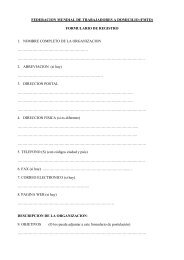that of the employer. - Homeworkers Worldwide
that of the employer. - Homeworkers Worldwide
that of the employer. - Homeworkers Worldwide
You also want an ePaper? Increase the reach of your titles
YUMPU automatically turns print PDFs into web optimized ePapers that Google loves.
Chapter 5: Employment status“Employ homeworkers, don’t take <strong>the</strong>m for granted.”“Give us <strong>the</strong> same rights as people who go out to work, sick pay,maternity pay and pension.”“<strong>Homeworkers</strong> should have an employment contract to say whatrights you have got.”Thousands <strong>of</strong> workers in <strong>the</strong> UK are vulnerable to exploitation fromunscrupulous <strong>employer</strong>s , ei<strong>the</strong>r because <strong>the</strong>y do not have full employeestatus, or because it is unclear whe<strong>the</strong>r <strong>the</strong>y have employment status ornot. Uncertain employment status is a major problem for homeworkers in<strong>the</strong> UK, as well as o<strong>the</strong>r kinds <strong>of</strong> atypical workers such as agency workersand temporary workers.<strong>Homeworkers</strong> who have worked for a company for several years,frequently on low wages, and <strong>of</strong>ten taking on rushed orders at shortnotice at <strong>the</strong> company’s convenience, can discover if <strong>the</strong>y becomepregnant, fall ill or <strong>the</strong>ir work simply stops <strong>the</strong>y have no protection under<strong>the</strong> law, because <strong>the</strong>y are not ‘employees.’Types <strong>of</strong> statusThere are three main types <strong>of</strong> employment status under UK law atpresent: employees, workers and <strong>the</strong> self-employed. Qualifying hurdlesand exclusions may apply, but in broad terms:• Employees are entitled to <strong>the</strong> full range <strong>of</strong> employment rights andprotection in respect <strong>of</strong> unfair dismissal, redundancy, sick leaveand pay, maternity leave and pay, <strong>the</strong> right to written terms andconditions.• Workers are entitled to a smaller range <strong>of</strong> basic protections - <strong>the</strong>most significant for homeworkers being minimum wage andholiday pay .• The self-employed are free to negotiate <strong>the</strong>ir own terms with <strong>the</strong>people <strong>the</strong>y contract with.“Give us <strong>the</strong> samerights as peoplewho go out towork, sick pay,maternity pay andpension.”In practice many homeworkers do not receive full employment rightsand – if challenged – <strong>the</strong>ir <strong>employer</strong>s can argue <strong>the</strong>y are ‘workers’ andnot technically ‘employees’. The only way this can be resolved is at anEmployment Tribunal which can be both an extremely stressful processand highly unpredictable.Alternatively homeworkers may be told by <strong>the</strong>ir <strong>employer</strong>s <strong>that</strong> <strong>the</strong>y areself-employed even if <strong>the</strong>y do not in practice have <strong>the</strong> independence orcontrol over <strong>the</strong>ir work patterns <strong>that</strong> would enable <strong>the</strong>m to genuinelynegotiate terms. False self-employment is just ano<strong>the</strong>r way for Technically those who engage homeworkers as ‘workers’ or ‘self-employed’ are notstrictly ‘<strong>employer</strong>s’ as <strong>the</strong>y are not employing homeworkers as ‘employees’. However, in <strong>the</strong>absence <strong>of</strong> a suitable term to describe all those who pay homeworkers to work for <strong>the</strong>m across aspectrum <strong>of</strong> employment relationships, this report uses ‘<strong>employer</strong>’ as a general term. Workers may be entitled to statutory sick pay if <strong>the</strong>y are paying Class 1 National Insurancecontributions through <strong>the</strong>ir <strong>employer</strong>.22 23




